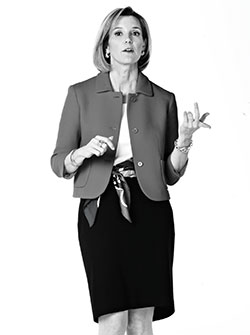
People say to me, ‘Has being a woman helped or hindered your career?’ And the answer is yes,” says Sallie Krawcheck, formerly one the highest-ranking women on Wall Street, over coffee at the Harvard Club one recent morning.
“When there are very, very few women at the top of those organizations,” she goes on, “you get a lot of attention.” But Krawcheck, now 48, knows that the attention can cut both ways. She was CEO of research firm Sanford C. Bernstein when Fortune put her on the cover in 2002, asking if she was the “last honest analyst” on Wall Street. Sandy Weill promptly brought her to Citigroup, where she helped repair the company’s image, which had been battered by sexual-discrimination suits and conflicting stock recommendations. Her performance received mixed reviews; she was promoted to chief financial officer only to move to wealth management a few years later, a change widely seen as a demotion. Then, in 2008, she was essentially fired after pushing for the bank to compensate investors who’d lost money taking the bank’s less than stellar advice on supposedly low-risk investments.
In the media, her ousting was often lumped with those of other women executives, particularly Morgan Stanley’s Zoe Cruz and Lehman Brothers’ Erin Callan, who were dropped during the financial crisis. “I did joke for a while that if I had dropped dead in 2008, 2009, or 2010, my tombstone was going to read, ‘SALLIE ZOE ERIN,’ ” Krawcheck says in her light Carolina accent. But unlike Cruz and Callan, Krawcheck seemed to rebound from the fall and skirt public scorn—after all, she’d taken a stand for smaller investors.
A year later, Bank of America hired her to take on Merrill Lynch’s wealth-management group. Profits improved during her tenure, but that, too, ended in a well-publicized management shake-up.
After she was “tossed out,” she says her friends and colleagues assumed she’d land at another bank. Instead, in May, Krawcheck made a surprise move, buying 85 Broads, a women’s networking platform started by Goldman Sachs alumnus Janet Hanson—85 Broad is the former address of Goldman headquarters—that she intends to expand into a vehicle for women to “invest in other women.”
The announcement was a surprise, in part because in her twenty-plus years on Wall Street, Krawcheck wasn’t exactly known as a strong advocate of women. “My kindest interpretation of my younger self is, Boy, was I busy. I had two kids, a husband, two stepkids,” says Krawcheck of her late arrival to feminist activism. “I mean, how many darn things can a person do at the end of the day?” Then she adds, “The other equally valid interpretation is that drawing attention to it was not something I felt would be particularly helpful to me or the other women at the organization.”
But sometime post-ousting, she decided that it might be helpful after all. As she cast about for her next job, “the women’s issue kept popping up,” she says. “I consider myself to be a recovering research analyst, and the numbers are just so damn compelling.” She then rattles off the numerous studies that show the more diverse an organization and its senior-leadership team, the better it is likely to perform, at least as a moneymaking enterprise. Yet that’s not a message Wall Street has received, Krawcheck continues, waving her hands in the air for emphasis.
When she was at Citi, serving as CEO of Smith Barney, she “loved every single second of it,” she says. “I loved my career so much I actually loved getting fired.” Still, she was under no illusions about what sort of place it was. Even a few years before, she says branch managers were known for relying on a Marine Corps questionnaire as a hiring-and-firing guide.
There were never that many women in the financial-services sector, but after the meltdown, the numbers began sliding. Krawcheck says she gets it. The men are reverting to their comfort zone. “When I feel risk averse, I am much more likely to surround myself with middle-aged professional southern females; I just am,” she says. “Because I can very easily imagine how I myself would do the job.”
In Krawcheck’s reasoning, it’s not that the men on Wall Street aren’t aware of the helpfulness of diversity of opinion, it’s just that they can’t help sticking to their own, which explains not only the lack of women in the upper echelons but the insular thinking that led to the 2008 crash. “I have spent a lot of time thinking about what could the company have done differently, and I think the answer gets down to groupthink with people who grew up together, with the same information, having the same conversations again and again and again.”
Networking was the “unspoken secret to success on Wall Street,” she realized. “For whatever reason, people are more comfortable networking with their own gender.” She hopes 85 Broads will provide women with the boost men effortlessly offer one another. The year she left Bank of America, she got her own lesson in the importance of maintaining an outside network. Holiday cards from her former colleagues, she says, “were down by 95 percent.”
Have good intel? Send tips to intel@nymag.com.